
Operator’s manual
Wheel Loader

May 2013 Edition

You have opted for a Wacker Neuson loader – thank you very much for putting your trust in us.
Your Wacker Neuson loader is a powerful product with robust technology and a wide range of applications to aid you in
your day-to-day work. In order to familiarize yourself with your loader in a quick, comprehensive manner, please read
this Operator’s Manual attentively.
In addition to the information regarding operation, this Operator’s Manual also contains important maintenance and op-
erating instructions for conserving the value of your loader. Furthermore, we will show you how to operate your loader in
an environmentally sound manner.
Should you have any questions or problems relating to your loader, please contact your Wacker Neuson partner or im-
porter. They will be happy to respond to your questions, suggestions or criticisms at any time.
We are condent that you will be very satised with your new Wacker Neuson loader.
Wacker Neuson SE

Contents
2
TABLE OF CONTENTS
Preface .............................................................................................................................................................. 7
1 BASIC INFORMATION .....................................................................................................................................8
1.1 Notes about this Operator’s Manual .....................................................................................................9
1.2 Explanation of the symbols used in this Operator’s Manual ...............................................................10
1.3 Warranty and liability ..........................................................................................................................12
1.4 Intended use ....................................................................................................................................... 13
2 BASIC SAFETY INSTRUCTIONS .................................................................................................................. 16
2.1 Organizational measures .................................................................................................................... 17
2.2 Selection and qualication of personnel / basic duties .......................................................................19
2.3 Safety instructions for certain operating phases ................................................................................20
2.3.1 Safety instructions for normal operation .............................................................................................20
2.3.2 Safety instructions for other operating modes ....................................................................................22
2.4 Safety instructions for particular hazards ........................................................................................... 25
2.4.1 Forklift attachment .............................................................................................................................. 25
2.4.2 Working near overhead power lines ...................................................................................................26
2.4.3 Electrical power ..................................................................................................................................27
2.4.4 Flying sparks / re danger ...................................................................................................................27
2.4.5 Gas, dust, steam, smoke ....................................................................................................................28
2.4.6 Hydraulics, pneumatics .......................................................................................................................28
2.4.7 Tip-overs .............................................................................................................................................29
2.4.8 Noise ...................................................................................................................................................29
2.4.9 Oils, grease and other chemical substances ......................................................................................29

Contents
3
2.5 Transporting and towing / restarting ...................................................................................................30
2.6 Final decommissioning / dismantling .................................................................................................. 30
2.7 Safety labels used ...............................................................................................................................31
2.8 Safety devices .....................................................................................................................................36
2.8.1 Fire extinguisher .................................................................................................................................36
2.8.2 Rotating beacon ..................................................................................................................................36
2.8.3 Seat belt ..............................................................................................................................................37
2.8.4 Emergency exit ...................................................................................................................................38
2.8.5 Backup alarm for reverse drive ...........................................................................................................38
2.8.6 Seat contact switch .............................................................................................................................38
2.8.7 Battery disconnect switch ................................................................................................................... 39
2.8.8 Loader lift arm locking system ............................................................................................................40
3 TECHNICAL DATA .......................................................................................................................................... 41
3.1 Technical description .......................................................................................................................... 41
3.2 Loader data .........................................................................................................................................43
3.3 Product identication number plates ...................................................................................................45
3.4 Dimensions ......................................................................................................................................... 46
4 DESCRIPTION OF THE INDICATOR, WARNING AND CONTROL ELEMENTS .........................................48
4.1 Operating elements and instruments ..................................................................................................48
4.2 Control and warning indicator lights ....................................................................................................50
4.3 Switches / rocker switches ..................................................................................................................54
4.4 Indicator devices .................................................................................................................................58

Contents
4
5 OPERATING AND OPERATION ....................................................................................................................60
5.1 Before starting up ...............................................................................................................................60
5.1.1 Fueling ................................................................................................................................................60
5.1.2 Operation ............................................................................................................................................ 62
5.1.3 Doors and windows ............................................................................................................................64
5.1.4 Adjusting the operator’s seat ..............................................................................................................66
5.1.5 Adjusting the steering column .............................................................................................................69
5.1.6 Seat belt ..............................................................................................................................................70
5.2 Starting up ..........................................................................................................................................73
5.2.1 Lighting system and forward warning device ...................................................................................... 74
5.2.2 Wipers and windshield washer system ...............................................................................................75
5.2.3 Headlights and rotating beacon ..........................................................................................................76
5.2.4 Ventilation and heating of the cab .......................................................................................................78
5.2.5 Before starting the engine ...................................................................................................................80
5.2.6 Starting the engine ..............................................................................................................................81
5.3 Propulsion operation ...........................................................................................................................84
5.3.1 Preparation for travel in public trafc .................................................................................................. 84
5.3.2 Travel speed ........................................................................................................................................85
5.3.3 Stopping and parking ..........................................................................................................................89
5.4 Work operation ....................................................................................................................................90
5.4.1 Operating lever for Loader lift arms .................................................................................................... 92
5.4.2 Loader lift arms locking system ..........................................................................................................94
5.4.3 Activating the optional hydraulics........................................................................................................95
5.4.4 Differential lock ...................................................................................................................................99
5.4.5 Changing attachments ......................................................................................................................100
5.4.6 Bucket ............................................................................................................................................... 109
5.4.7 Tip-overs ............................................................................................................................................115

Contents
5
5.4.8 Precaution measures for various temperature conditions .................................................................116
5.5 Optional equipment ............................................................................................................................118
6 TOWING AND TRANSPORTING .................................................................................................................122
6.1 Towing ...............................................................................................................................................122
6.2 Transporting ...................................................................................................................................... 126
7 LOWERING LOADER ARMS........................................................................................................................133
8 RELIEVING RESIDUAL PRESSURE IN THE HYDRAULIC SYSTEM ........................................................134
9 SECURING THE LOADER ........................................................................................................................... 137
10 SERVICING AND INSPECTION ...................................................................................................................138
10.1 Basic safety instructions for servicing and inspection ......................................................................138
10.2 Servicing and inspection intervals ....................................................................................................146
10.3 Lubrication schedule .........................................................................................................................158
10.4 Cleaning the loader ...........................................................................................................................160
10.5 General safety check ........................................................................................................................162
10.6 Specications and lling quantities ...................................................................................................163
10.7 Maintenance and inspection work ....................................................................................................164
10.7.1 Preparation for maintenance and inspection work ...........................................................................164
10.7.2 Servicing the engine .........................................................................................................................167
10.7.3 Servicing the fuel system .................................................................................................................. 173
10.7.4 Servicing the air lter system ............................................................................................................177
10.7.5 Servicing the cooling system ............................................................................................................ 180
10.7.6 Servicing the hydraulic system .........................................................................................................188

Contents
6
10.7.7 Servicing the axles ........................................................................................................................... 197
10.7.8 Servicing the brakes ......................................................................................................................... 201
10.7.9 Servicing the tires and wheels ..........................................................................................................204
10.7.10 Servicing the cab vent lter ...............................................................................................................208
10.7.11 Filling the container for the windshield washer system .....................................................................209
10.7.12 Servicing the electrical system ......................................................................................................... 210
10.8 Jump-starting / emergency starting .................................................................................................. 218
10.9 Loader storage ..................................................................................................................................221
11 TROUBLESHOOTING AND EMERGENCY MAINTENANCE ......................................................................224
12 SAFETY INSTRUCTIONS FOR REPAIRS ...................................................................................................228
12.1 General safety regulations for repairs...............................................................................................228
12.2 Engine ...............................................................................................................................................231
12.3 Welding work ....................................................................................................................................231
12.4 Hydraulic system ...............................................................................................................................233
12.5 Brakes ...............................................................................................................................................233
13 FINAL SHUTDOWN OF THE LOADER / DECOMMISSIONING .................................................................234
14 APPENDIX .................................................................................................................................................... 236
14.1 Ordering replacement parts ..............................................................................................................236
14.2 Inspection verication ....................................................................................................................... 238
Index ..........................................................................................................................................................242
List of gures
......................................................................................................................................................246

Preface
7
Preface
This Operator’s Manual describes how to operate and
service the loader. It provides operating and maintenance
personnel with the necessary knowledge of the loader‘s
functional characteristics in order to allow them to operate,
diagnose, maintain and repair the loader safely.
Observing the specications in this Operator’s Manual as-
sures:
• proper, safe, professional operation of the loader
• professional service, cleaning and care of the loader
Observe the applicable OSHA 1910 and 1926 safety regula-
tions when they apply to the user.
If required, the user/operator should supplement the Op-
erator’s Manual with instructions and regulations regarding
environmental protection and national regulations relating
to accident prevention.
All persons involved in work on or with the loader must
read and apply this Operator’s Manual, for example with
regard to:
• operation, including setup, maintenance during opera-
tion, care, disposal of auxiliary materials and operating
materials as well as disposal of the entire loader.
• maintenance (inspection, servicing, care).
• transport.
Should you have questions about this Operator’s Manual, please contact your dealer or visit us at www.wackerneuson.com.
The Operator’s Manual must always be located in
the loader or at the place where it is being used.
This Operator’s Manual is not designed for pur-
poses of extensive maintenance work. Such work
must be performed by approved professionals.

Basic information
8
Each new user must be instructed before using the loader
for the rst time.
Instructions for using the Operator’s Manual:
•
Read the Operator’s Manual carefully before starting
up the loader
• Observe all the safety instructions
• Follow the regulations and laws applicable at the place
of use
• Keep the Operator’s Manual in the protected compart-
ment provided in the operator station/cab.
1 BASIC INFORMATION
If it is not possible to rule out hazards to persons or material
during work according to the loader‘s intended use, these
hazards will be indicated by means of safety labels.
Instructions relate to the direction of travel of the loader;
this means that, when directional information is given, it
can be assumed that this refers to the direction of travel
of the loader.

Basic information
9
1.1 Notes about this Operator’s Manual
The specications, illustrations, weight information and
technical data are not binding and correspond to the state
of the art at the time of printing. We must reserve the right
to make changes without prior notice in the area of design,
conguration, appearance and technology on account of
the ongoing further development of the products.
Contact your dealer for clarication of use and/or instruc-
tions concerning intended use and attachments identied
in this Operator’s Manual.
Always strictly observe the safety instructions in this Opera-
tor’s Manual and the legal and trade association regulations
at the usage location.
This Manual provides information and procedures to safely
operate and maintain this Wheel Loader. For your own safety
and to reduce the risk of injury, carefully read, understand,
and observe all instructions described in this Manual.
Wacker Neuson Corporation expressly reserves the right
to make technical modications, even without notice, which
improve the performance or safety standards of its ma-
chines. The information contained in this manual is based
on machines manufactured up until the time of publication.
Wacker Neuson Corporation reserves the right to change
any portion of this information without notice.

Basic information
10
1.2 Explanation of the symbols used in this Operator’s Manual
To ensure safe operation and maintenance of the wheel
loader, it is necessary that you follow all the instructions in
this Operator’s Manual.
The following symbols and the signal words DANGER,
WARNING, CAUTION, NOTICE, and NOTE, and the ad-
jacent text, indicate hazards and instructions.
This is the safety alert symbol. It is used to alert
you to potential personal hazards.
► Obey all safety messages that follow this sym-
bol.
DANGER
DANGER indicates a hazardous situation which,
if not avoided, will result in death or serious injury.
►
Obey all safety messages that follow this symbol
to avoid injury or death.
WARNING
WARNING indicates a hazardous situation which, if
not avoided, could result in death or serious injury.
►
Obey all safety messages that follow this symbol
to avoid possible injury or death.

Basic information
11
CAUTION
CAUTION indicates a hazardous situation which,
if not avoided, could result in minor or moderate
injury.
►
Obey all safety messages that follow this symbol
to avoid possible minor or moderate injury.
NOTICE: Used without the safety alert symbol,
NOTICE indicates a situation which, if not avoided,
could result in property damage.
Important general instructions
ENVIRONMENTAL NOTE
Important general instructions for environmental
protection
Note: Contains additional information important
to a procedure.

Basic information
12
1.3 Warranty and liability
Observe the following points:
• Do not make any changes to the wheel loader.
•
Use only Wacker Neuson- approved attachments for
your loader.
• The loader many only be started up, operated and ser-
viced as described in the Operator’s Manual.
• Use the loader only if all the safety and protection de-
vices are intact.
• Observe the monitoring systems during operation.
•
Repairs may only be performed by trained professionals.
• Follow the Operator’s Manual exactly.
The manufacturer/supplier is not liable for damage
resulting from unintended use. The operator/user
is the sole bearer of this risk.
The Operator’s Manual must always be located in
the loader or at the place where it is being used.
Place the Operator’s Manual in the document pock-
et at the rear of the operator‘s platform.
Fig. 1
Document pocket

Basic information
13
Read and understand the operating instructions in this Man-
ual before operating this wheel loader. Before performing
production work, the operator should nd a remote site to
become familiar with the controls and machine response.
The machine shall be in serviceable condition before at-
tempting to use it as described in the operating instructions.
If the wheel loader is determined not to be in serviceable
condition, notify the site or machine supervisor to have it
repaired before use.
The loader is used to dislodge and load material by moving
the loader forward, taking into account the safety instructions
/ regulations and time periods listed by Wacker Neuson in
the Operator’s Manual. One work cycle consists of picking
up, lifting, transporting and unloading the material.
1.4 Intended use
The loader has been built according to applicable standards
and regulations. Operation by inexperienced persons, or in
an unintended manner, can result in hazards that can lead
to personal risk and subsequent harm to the operator and
persons in the operating area of the wheel loader. Improper
use can damage the wheel loader as well as property in the
vicinity of operation.
Unintended use can endanger the lives of operating
personnel or other persons and cause injuries or
extensive material damage.

Basic information
14
Similar uses of the loader with alternative attachments which
do not change the safety requirements for the loader but
modify the way in which it is used are only acceptable when
attachments that have been expressly approved by Wacker
Neuson are employed. Special conditions apply if you use
optional Wacker Neuson attachments.
The intended operation is described in this Operator’s
Manual. The instructions describe how to operate, main-
tain, inspect and adjust the wheel loader safely. The repair
manual provides additional instruction for safely diagnosing
malfunctions and repairing the wheel loader to maintain
service and performance levels.
The wheel loader shall not be employed for any of the fol-
lowing work activities:
• lifting or transporting people
• using it as a working platform
• using it to lift or transport loads without providing work
equipment for it
• pulling trailer loads
•
operating after the machine has received unauthorized
repairs
• operating with unauthorized modications

Basic information
15

Basic safety instructions
16
2 BASIC SAFETY INSTRUCTIONS
•
Use the loader and attachments only as intended and
in serviceable condition.
•
Observe the operating instructions described in this
Operator’s Manual and all applicable work site safety
regulations.
• Observe the permissible payloads.
• Wheel Loaders may only be used on suitable terrain.
This Wheel Loader is equipped with a Starter Lock
/ Drive Lock which must be kept operational.

Basic safety instructions
17
2.1 Organizational measures
The following safety instructions are directed at the operator
/ user of the loader.
•
Always keep the Operator’s Manual in the compartment
provided for it.
• As a supplement to the Operator’s Manual, universally
valid legal and other binding regulations relating to road
trafc, compulsory coverage, accident prevention and
environmental protection must be observed, and users
must be instructed to observe them. This applies in par-
ticular to the maximum speed, depending on the model
and the permissible total weight of the loader.
•
If required, instruct that personal protective equipment be
worn. This applies particularly to the handling of harmful
substances at the location of use.
•
Supplement the Operator’s Manual with instructions,
including supervisory and reporting requirements, taking
into account differences between various companies,
e.g. with regard to the organization of work, work pro-
cesses or personnel used.
•
Personnel who have been assigned to operate the loader
must have read the Operator’s Manual before operating
the wheel loader especially the chapter Basic Safety
Instructions.
• Observe all safety messages on the loader and in the
Operator’s Manual.
•
Make sure that all safety messages on the machine
are legible.
•
If the loader becomes unserviceable, stop operating and
inform the supervisor that the wheel loader is not func-
tioning normally. Alternately, contact a trained technician
to diagnose and correct the condition before resuming
operation.
•
No modications shall be made to the wheel loader.
Contact your Wacker Neuson dealer for specic advice
regarding the use of the wheel loader and approved
attachments.

Basic safety instructions
18
• If worn or damaged parts need replacement, use only
Wacker Neuson replacement parts to ensure optimum
performance and safety.
• Inspect hydraulic hoses and ttings prior to the start of
each work shift. Correct any observed leaks or abrasion
issues before operating the machine. Extended envi-
ronmental exposure can cause undetectable damage.
Replace hose assemblies periodically as advised in the
maintenance schedule.
•
Thoroughly inspect the wheel loader before each op-
erating shift.
•
The Wheel Loader Repair Manual describes the special
tools, diagnosis techniques, repair sequence proce-
dures, lifting and supporting devices needed to repair this
machine. To avoid unnecessary hazards and possible
damage to the Wheel Loader, do not attempt to repair
this machine without complying with the instructions in
the Repair Manual.
•
Make the location and means of operation of the re
extinguishers known, and consider the options for re
detection and ghting.
•
A Falling Object Protection System (FOPS) is available
for the Wheel Loader Operator Protection System. OSHA
and MSHA require this protection when operating with
overhead hazards. Contact your Wacker Neuson dealer
for advice and availability of a certied FOPS.
Page is loading ...
Page is loading ...
Page is loading ...
Page is loading ...
Page is loading ...
Page is loading ...
Page is loading ...
Page is loading ...
Page is loading ...
Page is loading ...
Page is loading ...
Page is loading ...
Page is loading ...
Page is loading ...
Page is loading ...
Page is loading ...
Page is loading ...
Page is loading ...
Page is loading ...
Page is loading ...
Page is loading ...
Page is loading ...
Page is loading ...
Page is loading ...
Page is loading ...
Page is loading ...
Page is loading ...
Page is loading ...
Page is loading ...
Page is loading ...
Page is loading ...
Page is loading ...
Page is loading ...
Page is loading ...
Page is loading ...
Page is loading ...
Page is loading ...
Page is loading ...
Page is loading ...
Page is loading ...
Page is loading ...
Page is loading ...
Page is loading ...
Page is loading ...
Page is loading ...
Page is loading ...
Page is loading ...
Page is loading ...
Page is loading ...
Page is loading ...
Page is loading ...
Page is loading ...
Page is loading ...
Page is loading ...
Page is loading ...
Page is loading ...
Page is loading ...
Page is loading ...
Page is loading ...
Page is loading ...
Page is loading ...
Page is loading ...
Page is loading ...
Page is loading ...
Page is loading ...
Page is loading ...
Page is loading ...
Page is loading ...
Page is loading ...
Page is loading ...
Page is loading ...
Page is loading ...
Page is loading ...
Page is loading ...
Page is loading ...
Page is loading ...
Page is loading ...
Page is loading ...
Page is loading ...
Page is loading ...
Page is loading ...
Page is loading ...
Page is loading ...
Page is loading ...
Page is loading ...
Page is loading ...
Page is loading ...
Page is loading ...
Page is loading ...
Page is loading ...
Page is loading ...
Page is loading ...
Page is loading ...
Page is loading ...
Page is loading ...
Page is loading ...
Page is loading ...
Page is loading ...
Page is loading ...
Page is loading ...
Page is loading ...
Page is loading ...
Page is loading ...
Page is loading ...
Page is loading ...
Page is loading ...
Page is loading ...
Page is loading ...
Page is loading ...
Page is loading ...
Page is loading ...
Page is loading ...
Page is loading ...
Page is loading ...
Page is loading ...
Page is loading ...
Page is loading ...
Page is loading ...
Page is loading ...
Page is loading ...
Page is loading ...
Page is loading ...
Page is loading ...
Page is loading ...
Page is loading ...
Page is loading ...
Page is loading ...
Page is loading ...
Page is loading ...
Page is loading ...
Page is loading ...
Page is loading ...
Page is loading ...
Page is loading ...
Page is loading ...
Page is loading ...
Page is loading ...
Page is loading ...
Page is loading ...
Page is loading ...
Page is loading ...
Page is loading ...
Page is loading ...
Page is loading ...
Page is loading ...
Page is loading ...
Page is loading ...
Page is loading ...
Page is loading ...
Page is loading ...
Page is loading ...
Page is loading ...
Page is loading ...
Page is loading ...
Page is loading ...
Page is loading ...
Page is loading ...
Page is loading ...
Page is loading ...
Page is loading ...
Page is loading ...
Page is loading ...
Page is loading ...
Page is loading ...
Page is loading ...
Page is loading ...
Page is loading ...
Page is loading ...
Page is loading ...
Page is loading ...
Page is loading ...
Page is loading ...
Page is loading ...
Page is loading ...
Page is loading ...
Page is loading ...
Page is loading ...
Page is loading ...
Page is loading ...
Page is loading ...
Page is loading ...
Page is loading ...
Page is loading ...
Page is loading ...
Page is loading ...
Page is loading ...
Page is loading ...
Page is loading ...
Page is loading ...
Page is loading ...
Page is loading ...
Page is loading ...
Page is loading ...
Page is loading ...
Page is loading ...
Page is loading ...
Page is loading ...
Page is loading ...
Page is loading ...
Page is loading ...
Page is loading ...
Page is loading ...
Page is loading ...
Page is loading ...
Page is loading ...
Page is loading ...
Page is loading ...
Page is loading ...
Page is loading ...
Page is loading ...
Page is loading ...
Page is loading ...
Page is loading ...
Page is loading ...
Page is loading ...
Page is loading ...
Page is loading ...
Page is loading ...
Page is loading ...
Page is loading ...
Page is loading ...
Page is loading ...
Page is loading ...
Page is loading ...
Page is loading ...
Page is loading ...
Page is loading ...
Page is loading ...
Page is loading ...
Page is loading ...
Page is loading ...
Page is loading ...
Page is loading ...
Page is loading ...
-
 1
1
-
 2
2
-
 3
3
-
 4
4
-
 5
5
-
 6
6
-
 7
7
-
 8
8
-
 9
9
-
 10
10
-
 11
11
-
 12
12
-
 13
13
-
 14
14
-
 15
15
-
 16
16
-
 17
17
-
 18
18
-
 19
19
-
 20
20
-
 21
21
-
 22
22
-
 23
23
-
 24
24
-
 25
25
-
 26
26
-
 27
27
-
 28
28
-
 29
29
-
 30
30
-
 31
31
-
 32
32
-
 33
33
-
 34
34
-
 35
35
-
 36
36
-
 37
37
-
 38
38
-
 39
39
-
 40
40
-
 41
41
-
 42
42
-
 43
43
-
 44
44
-
 45
45
-
 46
46
-
 47
47
-
 48
48
-
 49
49
-
 50
50
-
 51
51
-
 52
52
-
 53
53
-
 54
54
-
 55
55
-
 56
56
-
 57
57
-
 58
58
-
 59
59
-
 60
60
-
 61
61
-
 62
62
-
 63
63
-
 64
64
-
 65
65
-
 66
66
-
 67
67
-
 68
68
-
 69
69
-
 70
70
-
 71
71
-
 72
72
-
 73
73
-
 74
74
-
 75
75
-
 76
76
-
 77
77
-
 78
78
-
 79
79
-
 80
80
-
 81
81
-
 82
82
-
 83
83
-
 84
84
-
 85
85
-
 86
86
-
 87
87
-
 88
88
-
 89
89
-
 90
90
-
 91
91
-
 92
92
-
 93
93
-
 94
94
-
 95
95
-
 96
96
-
 97
97
-
 98
98
-
 99
99
-
 100
100
-
 101
101
-
 102
102
-
 103
103
-
 104
104
-
 105
105
-
 106
106
-
 107
107
-
 108
108
-
 109
109
-
 110
110
-
 111
111
-
 112
112
-
 113
113
-
 114
114
-
 115
115
-
 116
116
-
 117
117
-
 118
118
-
 119
119
-
 120
120
-
 121
121
-
 122
122
-
 123
123
-
 124
124
-
 125
125
-
 126
126
-
 127
127
-
 128
128
-
 129
129
-
 130
130
-
 131
131
-
 132
132
-
 133
133
-
 134
134
-
 135
135
-
 136
136
-
 137
137
-
 138
138
-
 139
139
-
 140
140
-
 141
141
-
 142
142
-
 143
143
-
 144
144
-
 145
145
-
 146
146
-
 147
147
-
 148
148
-
 149
149
-
 150
150
-
 151
151
-
 152
152
-
 153
153
-
 154
154
-
 155
155
-
 156
156
-
 157
157
-
 158
158
-
 159
159
-
 160
160
-
 161
161
-
 162
162
-
 163
163
-
 164
164
-
 165
165
-
 166
166
-
 167
167
-
 168
168
-
 169
169
-
 170
170
-
 171
171
-
 172
172
-
 173
173
-
 174
174
-
 175
175
-
 176
176
-
 177
177
-
 178
178
-
 179
179
-
 180
180
-
 181
181
-
 182
182
-
 183
183
-
 184
184
-
 185
185
-
 186
186
-
 187
187
-
 188
188
-
 189
189
-
 190
190
-
 191
191
-
 192
192
-
 193
193
-
 194
194
-
 195
195
-
 196
196
-
 197
197
-
 198
198
-
 199
199
-
 200
200
-
 201
201
-
 202
202
-
 203
203
-
 204
204
-
 205
205
-
 206
206
-
 207
207
-
 208
208
-
 209
209
-
 210
210
-
 211
211
-
 212
212
-
 213
213
-
 214
214
-
 215
215
-
 216
216
-
 217
217
-
 218
218
-
 219
219
-
 220
220
-
 221
221
-
 222
222
-
 223
223
-
 224
224
-
 225
225
-
 226
226
-
 227
227
-
 228
228
-
 229
229
-
 230
230
-
 231
231
-
 232
232
-
 233
233
-
 234
234
-
 235
235
-
 236
236
-
 237
237
-
 238
238
-
 239
239
-
 240
240
-
 241
241
-
 242
242
-
 243
243
-
 244
244
-
 245
245
-
 246
246
-
 247
247
-
 248
248
-
 249
249
-
 250
250
-
 251
251
-
 252
252
-
 253
253
-
 254
254
Wacker Neuson WL36 Canopy User manual
- Type
- User manual
- This manual is also suitable for
Ask a question and I''ll find the answer in the document
Finding information in a document is now easier with AI
Related papers
-
Wacker Neuson WL30 User manual
-
Wacker Neuson WL50 User manual
-
Wacker Neuson WL36 User manual
-
Wacker Neuson WL36 User manual
-
Wacker Neuson SW24 User manual
-
Wacker Neuson WL60 User manual
-
Wacker Neuson WL38 User manual
-
Wacker Neuson ST28 (S05-5) User manual
-
Wacker Neuson ST28 (S05-5) User manual
-
Wacker Neuson ST28 (S05-5) User manual
Other documents
-
Solight 1V242 User manual
-
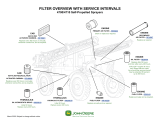 John Deere 4700 Owner's manual
John Deere 4700 Owner's manual
-
New Holland 200 Series User manual
-
Hyundai HSL1500T Track User manual
-
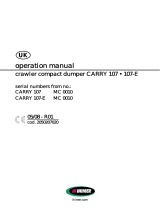 IHI IHIMER CARRY 107-E Operating instructions
IHI IHIMER CARRY 107-E Operating instructions
-
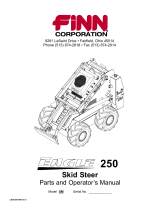 Finn Eagle 250 Owner's manual
Finn Eagle 250 Owner's manual
-
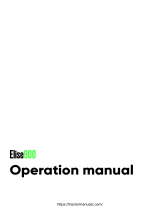 KOVACO Elise 900 User manual
KOVACO Elise 900 User manual
-
Rotary SPOA3TS-5SC-EH2 Owner's manual
-
Terex PT100 Forestry Operation and Maintenance Manual
-
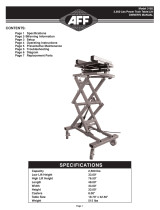 AFF 3182 Owner's manual
AFF 3182 Owner's manual


































































































































































































































































